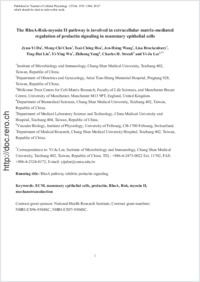The RhoA-Rok-myosin II pathway is involved in extracellular matrix-mediated regulation of prolactin signaling in mammary epithelial cells
- Du, Jyun-Yi Institute of Microbiology and Immunology, Chung Shan Medical University, Taichung, Taiwan
- Chen, Meng-Chi Institute of Microbiology and Immunology, Chung Shan Medical University, Taichung, Taiwan
- Hsu, Tsai-Ching Institute of Microbiology and Immunology, Chung Shan Medical University, Taichung, Taiwan
- Wang, Jen-Hsing Department of Obstetrics and Gynecology, Antai Tian-Sheng Memorial Hospital, Pingtung, Taiwan
- Brackenbury, Lisa Wellcome Trust Centre for Cell-Matrix Research, Faculty of Life Sciences, and Manchester Breast Centre, University of Manchester, Manchester, UK
- Lin, Ting-Hui Department of Biomedical Sciences, Chung Shan Medical University, Taichung, Taiwan
- Wu, Yi-Ying Department of Medical Laboratory Science and Biotechnology, China Medical University and Hospital, Taichung, Taiwan
- Yang, Zhihong Vascular Biology, Physiology Unit, Departement of Medicine, University of Fribourg, Switzerland
- Streuli, Charles H. Wellcome Trust Centre for Cell-Matrix Research, Faculty of Life Sciences, and Manchester Breast Centre, University of Manchester, Manchester, UK
- Lee, Yi-Ju Institute of Microbiology and Immunology, Chung Shan Medical University, Taichung, Taiwan - Department of Medical Research, Chung Shan Medical University Hospital, Taichung, Taiwan
-
11.01.2012
Published in:
- Journal of Cellular Physiology. - 2012, vol. 227, no. 4, p. 1553–1560
English
In mammary epithelial cells (MECs), prolactin-induced signaling and gene expression requires integrin-mediated cell adhesion to basement membrane (BM). In the absence of proper cell–BM interactions, for example, culturing cells on collagen-coated plastic dishes, signal propagation is substantially impaired. Here we demonstrate that the RhoA-Rok-myosin II pathway accounts for the ineffectiveness of prolactin signaling in MECs cultured on collagen I. Under these culture conditions, the RhoA pathway is activated, leading to downregulation of prolactin receptor expression and reduced prolactin signaling. Enforced activation of RhoA in MECs cultured on BM suppresses prolactin receptor levels, and prevents prolactin-induced Stat5 tyrosine phosphorylation and β-casein expression. Overexpression of dominant negative RhoA in MECs cultured on collagen I, or inhibiting Rok activity, increases prolactin receptor expression, and enhances prolactin signaling. In addition, inhibition of myosin II ATPase activity by blebbistatin also exerts a beneficial effect on prolactin receptor expression and prolactin signaling, suggesting that tension exerted by the collagen substratum, in collaboration with the RhoA-Rok-myosin II pathway, contributes to the failure of prolactin signaling. Furthermore, MECs cultured on laminin-coated plastic have similar morphology and response to prolactin as those cultured on collagen I. They display high levels of RhoA activity and are inefficient in prolactin signaling, stressing the importance of matrix stiffness in signal transduction. Our results reveal that RhoA has a central role in determining the fate decisions of MECs in response to cell–matrix interactions.
- Faculty
- Faculté des sciences et de médecine
- Department
- Département de Médecine
- Language
-
- English
- Classification
- Biological sciences
- License
-
License undefined
- Identifiers
-
- RERO DOC 28288
- DOI 10.1002/jcp.22886
- Persistent URL
- https://folia.unifr.ch/unifr/documents/302272
Statistics
Document views: 117
File downloads:
- pdf: 156
